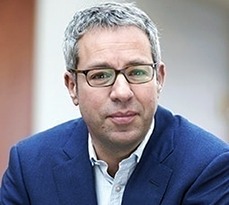Sir Mene Pangalos of AstraZeneca, in a Cambridge Judge interview, urges continuation of the ‘exceptional’ collaboration between industry, academia, government and regulators that led to rapid development of COVID-19 vaccines.

The “exceptional” collaboration between the pharmaceutical industry, academia, government, regulators and others that led to COVID-19 vaccines being rapidly developed and rolled out around the world will hopefully carry over productively into a post-pandemic world, said Sir Mene Pangalos, Executive Vice President of BioPharmaceuticals R&D at AstraZeneca.
A member of the Advisory Board of Cambridge Judge, Sir Mene was interviewed by Stelios Kavadias, Margaret Thatcher Professor of Enterprise Studies in Innovation & Growth, as part of a series of video interviews entitled CJBS Perspectives: Leadership in Unprecedented Times, organised by the Alumni & External Engagement team at Cambridge Judge.
“What’s been exceptional about the pandemic, when I think about the vaccines and antibodies that have been approved in record time … is the collaboration and partnership between so many different groups – the pharmaceutical industry, government, regulators, healthcare providers – we’ve all worked together in parallel, we’ve taken risks together and we ended up with multiple therapies in a time period no one would have ever anticipated,” he said.
“I hope some of that carries on in our future interactions with governments and regulators,” he added. “It won’t be with the same intensity, but I think some of it will continue in terms of how we engage and interact.”
At AstraZeneca, he said a “silver lining” of the pandemic had been “to speed up the company’s transition to digital.
“We’ve had to learn how to run clinical trials remotely without patients going into sites to see physicians, we’ve had to work out how to get medicines straight to patients’ homes, we’ve had to learn how to use digital apps to communicate and interact with patients.”
“So much of our digital journey has been accelerated … and ultimately that will make our industry more efficient, more nimble, more flexible,” he said.
Sir Mene arrived at AstraZeneca in 2010, following a career that included leadership roles at Wyeth, Pfizer and GlaxoSmithKline in the US and the UK. He implemented a five-part plan at AstraZeneca – right target, right tissue, right safety, right patient and right commercial opportunity – that in five years improved the conversion rate from preclinical investigation to completion of Phase III clinical trials from 4% to 19%, and it is now over 20% overall and around 30% in BioPharmaceuticals. “That translates into us launching a lot of new medicines, and revitalising the company,” he says in the interview.
Using a sporting analogy, he says the company successfully changed the R&D mindset from “personal bests” to “world records”.
“The way I’ve tried to shift our organisation is to try to start setting world records, and the way you set world records is to compete on the world stage – you compete in the Champions League, not just the Premier League”, including by publishing research in top global journals such as Nature, Science and Cell.
As for advice to young people starting their careers: “What I say to people who ask me is don’t be afraid to take risks with your career in terms of going to different countries, experiencing different cultures, disciplines and techniques and broadening your horizons as much as you can, particularly early on in your career because it just gives you that much more experience so that when you get to more senior roles you can interact and engage with people from different disciplines and different areas more easily.”


